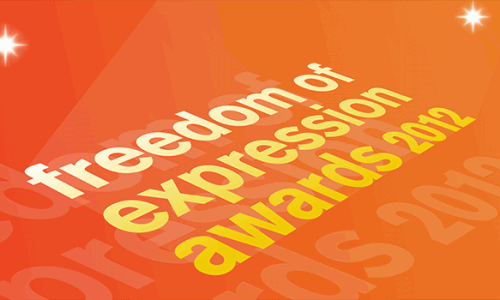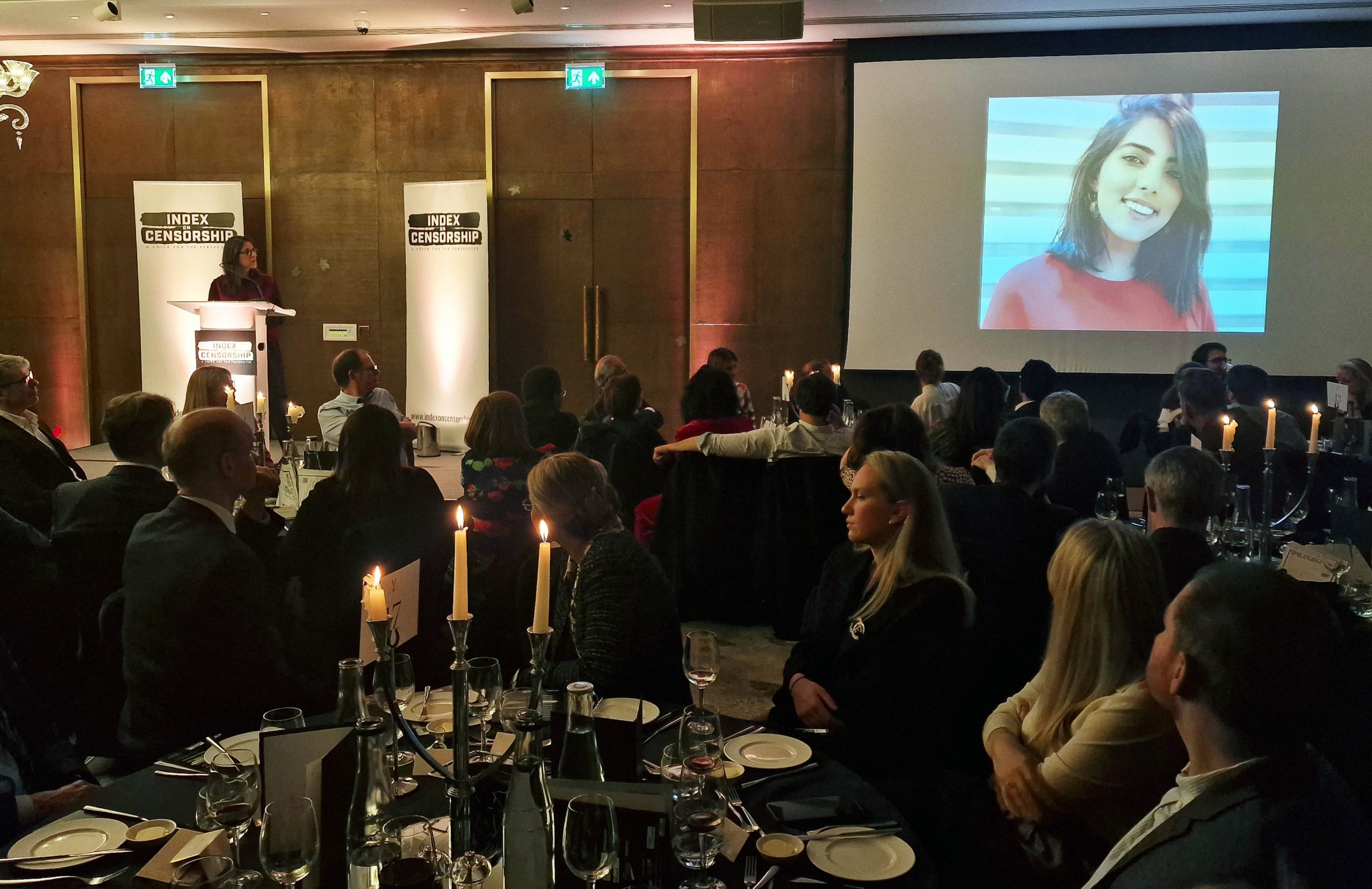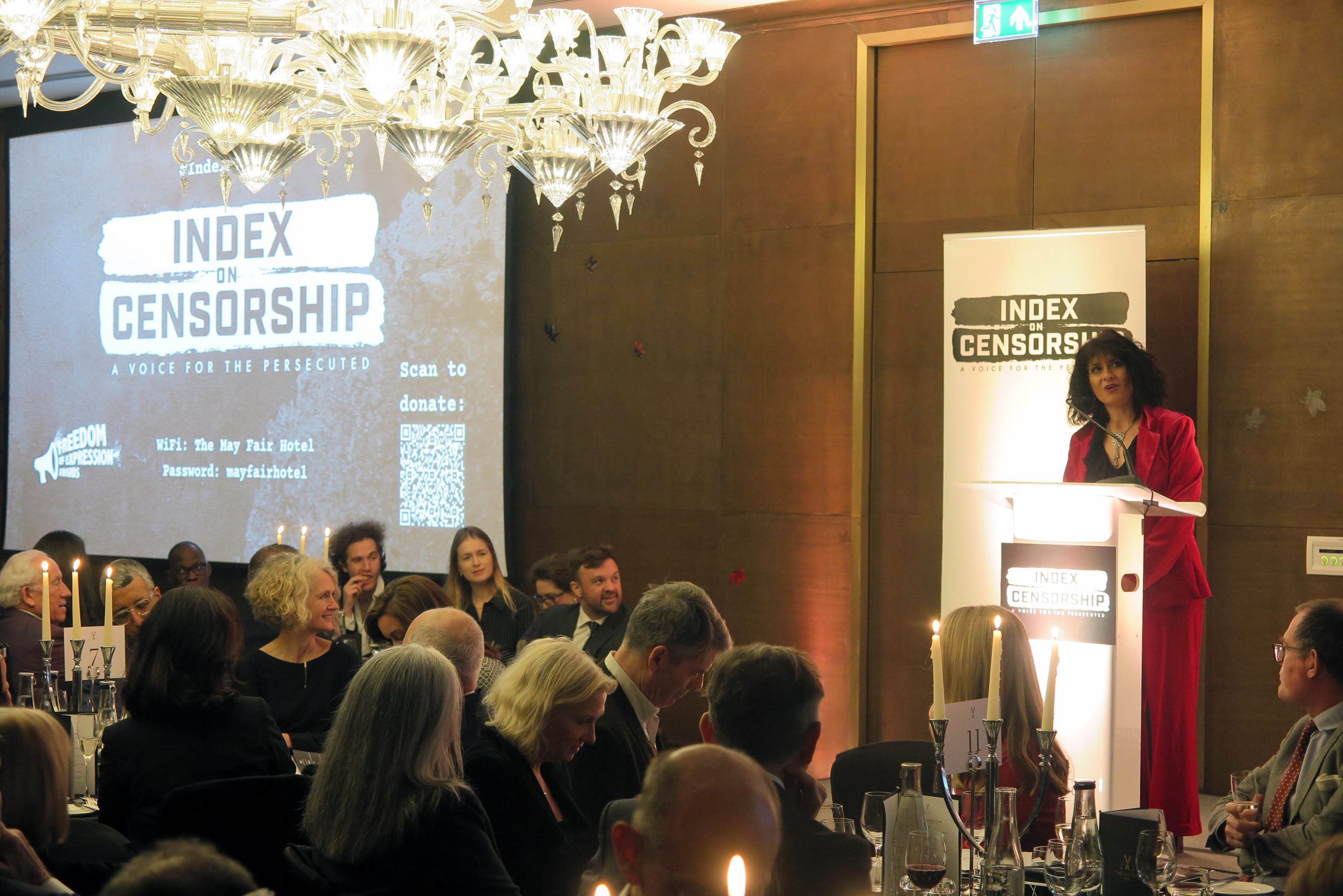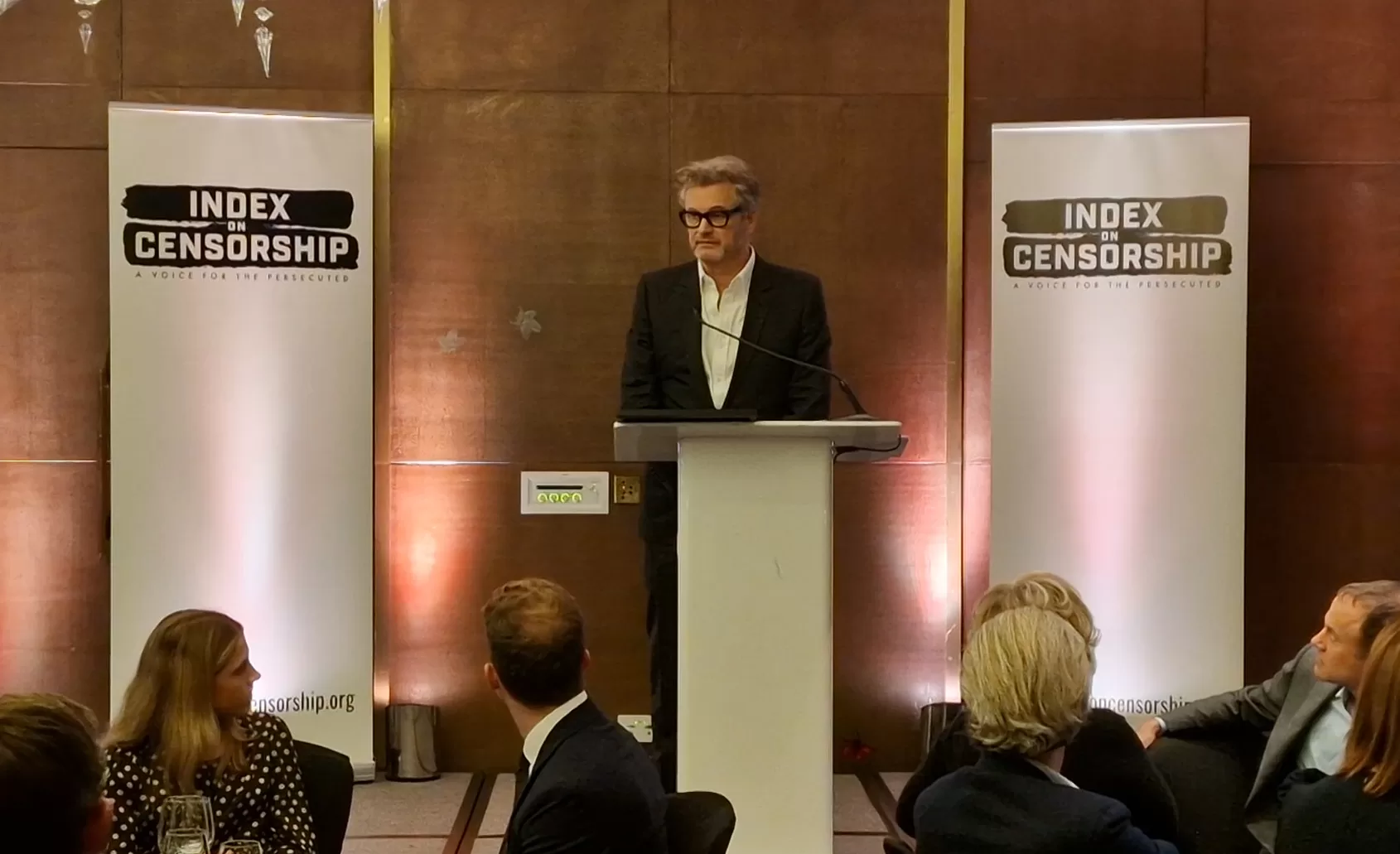[vc_row full_width=”stretch_row_content_no_spaces” css_animation=”fadeIn” css=”.vc_custom_1485788783247{padding-top: 250px !important;padding-bottom: 250px !important;background-image: url(https://www.indexoncensorship.org/wp-content/uploads/2012/11/awards2012_1460x490.jpg?id=81042) !important;background-position: center !important;background-repeat: no-repeat !important;background-size: cover !important;}”][vc_column][/vc_column][/vc_row][vc_row css=”.vc_custom_1472525914065{margin-top: -150px !important;}”][vc_column][vc_row_inner equal_height=”yes” content_placement=”middle”][vc_column_inner el_class=”awards-inside-desc” width=”1/2″][vc_custom_heading text=”FREEDOM OF EXPRESSION AWARDS 2012″ use_theme_fonts=”yes”][vc_column_text]Index on Censorship’s Freedom of Expression Awards exist to celebrate individuals or groups who have had a significant impact fighting censorship anywhere in the world.
- Awards were offered in four categories: Arts, Campaigning, Journalism and Innovation
- There was a special award to mark Index’s 40th anniversary
- Winners were honoured at a gala celebration in London at the St. Pancras Renaissance London Hotel
[/vc_column_text][/vc_column_inner][vc_column_inner width=”1/2″][vc_video link=”https://www.youtube.com/v/-dL6eCTwUi4″][/vc_column_inner][/vc_row_inner][/vc_column][/vc_row][vc_row css=”.vc_custom_1472608310682{margin-top: 0px !important;margin-bottom: 20px !important;}”][vc_column][vc_custom_heading text=”WINNERS” font_container=”tag:h1|text_align:center” use_theme_fonts=”yes” css=”.vc_custom_1477036676595{margin-top: 0px !important;}”][vc_row_inner][vc_column_inner width=”1/3″][staff name=”Idrak Abbasov” title=”The Guardian Journalism Award” color=”#28a7cc” profile_image=”81047″]Idrak Abbasov is an Azerbaijani journalist whose investigative work has put his life in danger. Abbasov reports for the newspaper Ayna-Zerkalo and for the Institute for War & Peace Reporting, which aims to give voice to people at the front line of conflict and crisis. On 9 September 2011, after Abbasov investigated the activities of a local oil company, the State Oil Company of Azerbaijan (SOCAR) sent bulldozers to his family’s home. SOCAR claimed ownership of the site as part of a project to develop local oil resources with Global Energy Azerbaijan Ltd. His parents and brother were hospitalised after being attacked by the company’s security service during the incident. No eviction notice had been lodged in a court, as is required by law, and no neighbouring residences (including that of the parliamentary speaker) were disturbed. It is believed that bulldozers targeted the journalist’s home because of his work monitoring human rights. The violence, threats, and harassment of Abbasov and his family continues. Later that month, his parents were again attacked at their home. The perpetrators arrived in a car bearing government licence plates. One reportedly said: “Tell Idrak to get smarter, or we will cut off his ears.” The Azerbaijanii government is notorious for using legal loopholes to threaten its opponents. Last year the home of human rights activist Leyla Yunus, the founder of the Institute for Peace and Democracy, was bulldozed on 11 August 2011 on a similar pretext. As attention focuses on Azerbaijan in 2012, with the country hosting the Eurovision Song Contest and the Internet
Goverance Forum, human rights violations show no sign of stopping.[/staff][/vc_column_inner][vc_column_inner width=”1/3″][staff name=”Nabeel Rajab, Bahrain Center for Human Rights” title=”Advocacy” color=”#28a7cc” profile_image=”81050″]The Bahrain Centre for Human Rights (BCHR) has played a crucial role in documenting human rights violations, political repression and torture in the gulf kingdom. Despite efforts to silence and discredit it, the BCHR has kept international attention on the brutal government crackdown that began last February. It has prevented the Bahrain government from whitewashing its international image, and at times when news media were severely restricted and foreign journalists barred, it acted as a crucial source of alternative news. Former BCHR president Abdulhady Al Khawaja is one of eight activists serving life sentences for peacefully protesting at the now-demolished Pearl Roundabout. Like many other activists he claims he has been tortured in prison. It is widely reported that BCHR employees regularly experience threats, violence and harassment. In January 2012, BCHR president Nabeel Rajab was severely beaten by security forces while peacefully protesting.[/staff][/vc_column_inner][vc_column_inner width=”1/3″][staff name=”Ali Ferzat” title=”Arts Award” color=”#28a7cc” profile_image=”81049″]Syrian cartoonist Ali Ferzat has been called “an icon of freedom in the Arab world”. He has spent decades ridiculing dictators in more than 15,000 caricatures. His depictions of President Assad and the police state have helped galvanise revolt in Syria. In August 2011, Ferzat was wrenched from his vehicle in central Damascus by pro-Assad masked gunmen who beat him badly and broke his hands. Passers-by found Ferzat dumped at the side of a road; his briefcase and the drawings inside it had been confiscated by his attackers. The BBC’s Sebastian Usher described the attack as a sign of Syria’s “zero tolerance” for dissent; a month earlier the dissident composer Ibrahim Al Qashoush was found dead, his vocal chords removed. Ferzat earned regional and international recognition in the 1980s with stinging cartoons of officials, autocrats and dictators including Saddam Hussein and Muammar Gaddafi. Hussein called for Ferzat’s death in 1989 after an unfavourable portrait of him was exhibited in Paris, and Ferzat’s cartoons are banned in Libya and Jordan. In 2000, he launched the publication Al Domari; Syrian authorities forced its closure three years later. Ferzat is undergoing rehabiliation in Kuwait in order to regain the use of his fingers.[/staff][/vc_column_inner][/vc_row_inner][vc_row_inner][vc_column_inner width=”1/3″][staff name=”Freedom Fone” title=”The Google Innovation Award” color=”#28a7cc” profile_image=”81048″]Kubatana is an NGO based in Harare, set up by Brenda Burrell, Bev Clark and Amanda Atwood. It encourages ordinary Zimbabweans to use information communication technology (ICT) to advocate, mobilise and lobby. One of their main focuses has been the development of local technologies on the principle that development work should strengthen the potential application of pre-existent resources, rather than innovating solely in high-tech gadgetry for a Western audience. For this reason, Kubatana developed Freedom Fone. A free software, Freedom Fone is a basic, easy to use interactive voice response system that can deliver audio information in any language over mobile phones and landlines. All you need is a telephone (landline, mobile, Skype or similar) and Freedom Fone software on a computer. The software is aimed at organisations or individuals wishing to set up interactive news services for users where the free flow of information may be being denied for political, technological or other reasons. Freedom Fone is designed help bridge the digital divide, to reach out to the 90% of Zimbabweans who do not have internet access. On top of giving people access to information, Freedom Fone can be a tool for circumventing censorship. This is because automated telephone information systems do not require a broadcasting licence. In addition, this type of digital content is not currently subject to censorship.[/staff][/vc_column_inner][vc_column_inner width=”1/3″][staff name=”Memorial Archive of St Petersburg” title=”40th Anniversary Award” color=”#28a7cc” profile_image=”81051″]Index singles out The Research and Information Centre Memorial, which logs the brutal repression suffered by millions in former Soviet countries, for their continued dedication to guaranteeing freedom of information. The centre has demonstrated a fierce commitment to protecting human rights. It not only chronicles the crimes of the Stalinist period, but monitors current threats against those who speak out against injustice. Memorial’s remarkable archive includes letters, diaries, transcripts, photographs, and sound files. Individuals with first-hand experience of Stalin’s terror and the Soviet gulag have donated documentation they had hidden during this brutal period.
The centre is a living tribute to the survivors of Soviet Russia, preserving documentation that many have tried to bury, and continue to conduct their work despite constant threats. In December 2009, a group of men from the Investigative Committee of the Russian General Prosecutor’s Office raided Memorial’s offices, confiscating hard drives and CDs containing its entire archive. The attack was condemned by activists and historians across the globe, and eventually all of the material was returned after a battle in local courts. Memorial’s work is a vivid reminder of the vital and very real risk taken by those who speak out against repression. The award is particularly pertinent in Index’s 40th year. As we explore our own archive and its role in exposing international human rights violations, we are conscious of the often undervalued work of historians and archivists in keeping the memory of these violations alive.[/staff][/vc_column_inner][vc_column_inner width=”1/3″][/vc_column_inner][/vc_row_inner][/vc_column][/vc_row][vc_row][vc_column][vc_custom_heading text=”JUDGING” font_container=”tag:h1|text_align:center” use_theme_fonts=”yes”][vc_row_inner el_class=”mw700″][vc_column_inner][vc_column_text]
Criteria – Anyone involved in tackling free expression threats – either through journalism, campaigning, the arts or using digital techniques – is eligible for nomination.
Any individual, group or NGO can nominate or self-nominate. There is no cost to apply.
Judges look for courage, creativity and resilience. We shortlist on the basis of those who are deemed to be making the greatest impact in tackling censorship in their chosen area, with a particular focus on topics that are little covered or tackled by others.
Nominees must have had a recognisable impact in the past 12 months.
Where a judge comes from a nominee’s country, or where there is any other potential conflict of interest, the judge will abstain from voting in that category.
Panel – Each year Index recruits an independent panel of judges – leading world voices with diverse expertise across campaigning, journalism, the arts and human rights.
The judges for 2012 were:
[/vc_column_text][/vc_column_inner][/vc_row_inner][vc_row_inner][vc_column_inner width=”1/3″][staff name=”Mishal Husain” title=”Broadcaster and journalist” color=”#28a7cc” profile_image=”80218″]Mishal Husain is a British news presenter for the BBC, who appears on Today, BBC World News and BBC Weekend News. She was previously a presenter on HARDtalk and BBC Breakfast.[/staff][/vc_column_inner][vc_column_inner width=”1/3″][staff name=”Peter Oborne” title=”Chief political commentator” color=”#28a7cc” profile_image=”80219″]Peter Alan Oborne is a British journalist. He is the associate editor of the Spectator and former chief political commentator of the Daily Telegraph, from which he resigned in early 2015. He is author of The Rise of Political Lying and The Triumph of the Political Class, and, with Frances Weaver, the pamphlet Guilty Men.[/staff][/vc_column_inner][vc_column_inner width=”1/3″][staff name=”Sami Ben Gharbia” title=”Advocacy director” color=”#28a7cc” profile_image=”80217″]Sami Ben Gharbia is a Tunisian human rights campaigner, blogger, writer and freedom of expression advocate. He was a political refugee living in the Netherlands between 1998 and 2011. Sami is the author of the e-book Borj Erroumi XL.[/staff][/vc_column_inner][/vc_row_inner][vc_row_inner][vc_column_inner width=”1/3″][staff name=”Jeremy Browne MP” title=”Minister for State” color=”#28a7cc” profile_image=”80216″]Jeremy Richard Browne is a British Liberal Democrat politician who was the Member of Parliament for Taunton Deane from 2005 to 2015. He was previously a Foreign Office and Home Office Minister.[/staff][/vc_column_inner][vc_column_inner width=”1/3″][staff name=”Sigrid Rausing” title=”Publisher” color=”#28a7cc” profile_image=”80220″]Sigrid Maria Elisabet Rausing is a Swedish philanthropist, anthropologist and publisher. She is the founder of the Sigrid Rausing Trust, one of the United Kingdom’s largest philanthropic foundations, and owner of Granta magazine and Granta Books.[/staff][/vc_column_inner][vc_column_inner width=”1/3″][/vc_column_inner][/vc_row_inner][/vc_column][/vc_row][vc_row css=”.vc_custom_1473325552363{margin-top: 0px !important;margin-bottom: 20px !important;padding-top: 0px !important;padding-right: 15px !important;padding-bottom: 0px !important;padding-left: 15px !important;}”][vc_column css=”.vc_custom_1473325567468{margin-top: 0px !important;margin-bottom: 0px !important;padding-top: 0px !important;padding-bottom: 0px !important;}”][awards_gallery_slider name=”GALLERY” images_url=”80387,80412,80411,80410,80409,80408,80407,80406,80405,80404,80403,80402,80401,80400,80399,80398,80397,80396,80395,80394,80393,80392,80391,80390,80389,80388,81051,81050,81049,81048,81047″][/vc_column][/vc_row]




